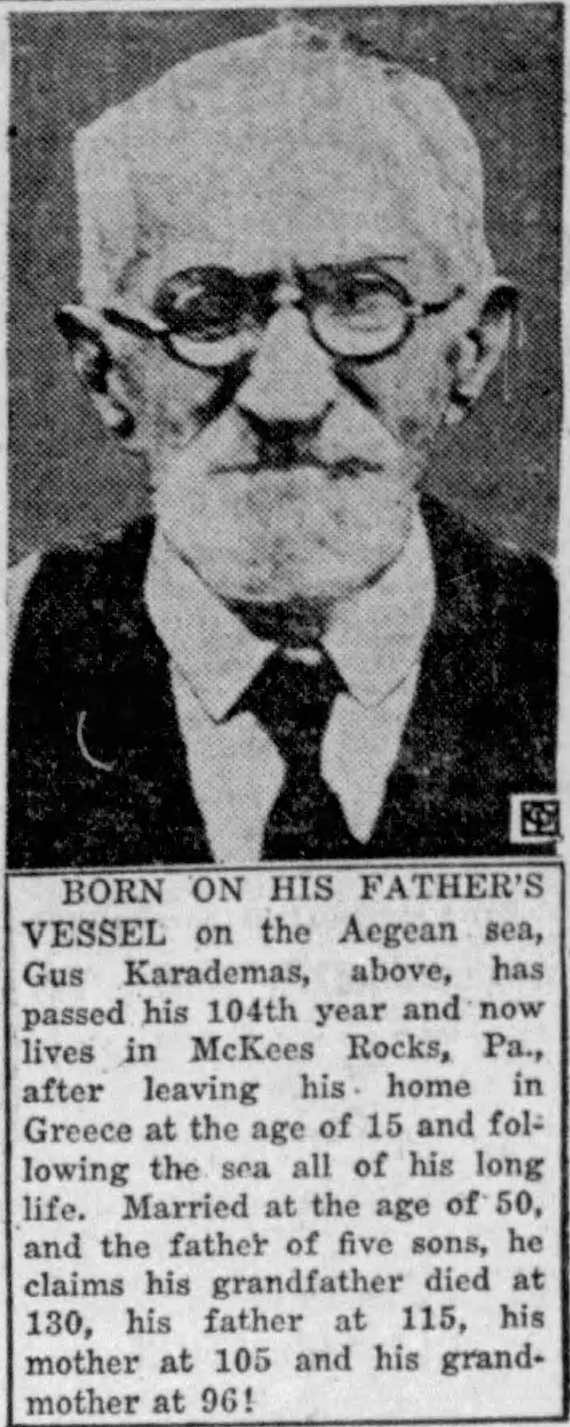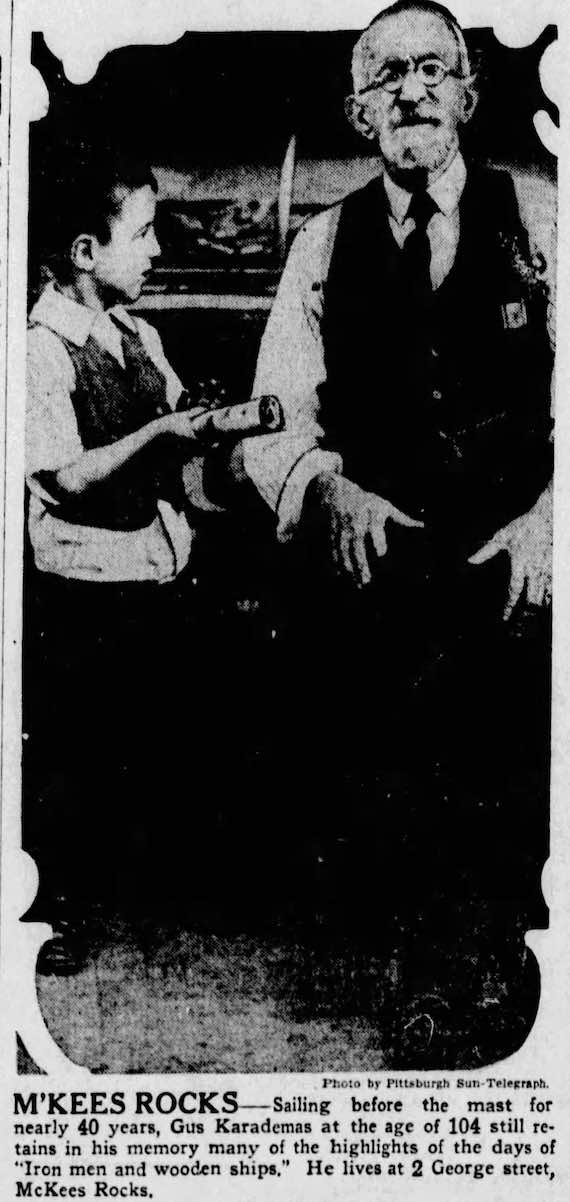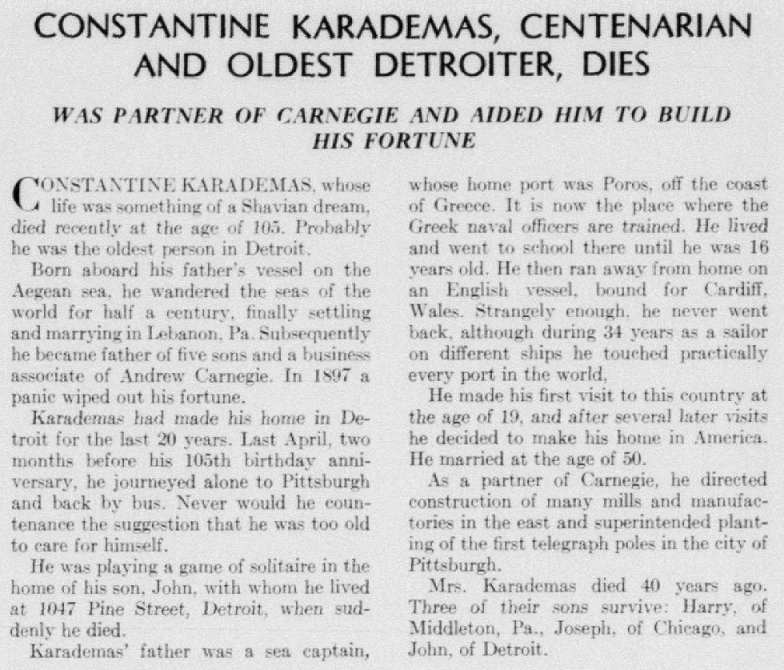Constantine 'Gus' Karademas

Constantine (Gus) Karademas at age 104
Source: The Dispatch (Moline, IL), 27 October 1928
Constantine (Gus) Karademas was born June 14 1824, on the Aegean Sea, on his father's own vessel, bound at the time for the island of Poros where his family lived. He lived and went to school in Poros until he was either 15 or 16 years old. Constantine ran away from home at that time and decided to be a sailor. He first came to the United States from Greece in 1843 at the age of 19, on a visit. He returned to Greece for a few short years, then came back to America. After 40 years at sea, he first lived in Philadelphia where he became a United States citizen; then settled in Lebanon, Pennsylvania; and moved to Pittsburgh, then McKees Rocks, a suburb of Pittsburgh.
In Pittsburgh, he became a business associate of the great American industrialists Andrew Carnegie and Henry Clay Frick. He directed the construction of many steel mills and manufacturing plants in the United States, and superintended the planting of the first telephone poles in Pittsburgh. In 1897, the financial panic wiped out his fortune.
Constantine Karademas was married. His wife passed away in 1884. Together, they had 5 sons. He moved to Detroit, Michigan and died there in 1929 at the age of 105 years.
The following is an article where Constantine (Gus) Karademas was interviewed and photographed at the age of 104.
104, He Recalls Days "When Men Were Iron"

Constantine (Gus) Karademas
Gus Karademas, In his one hundred and fifth year, sat at a little table in the back of a penny grocery in McKees Rocks [Pennsylvania], back where the thick shadows of dusk were reaching and darkening the room.
And Gus, 104 last June 14, was playing the well-known game solitaire.
He was swearing a little at the kings and queens – mumbllng, imprecating, denouncing them. Perhaps they weren't "coming out" for him. Perhaps he knew he was losng once more. That was Frlday afternoon, two days.
Mrs. Mary Vassos, owner and tender of the candy and fruit store at 2 Goorge Sreet, pointed him out.
LIKES TO TALK
"Thats him. No, he won't mind being disturbed. she said, smiling. "He fusses and fumes once in a while at the cards, but he's good natured and he'd be glad to talk. He likes to tell of his old days at sea: he likes to tell of his experiences."
She was right. Barring a few angry moments when his memory tricked him about names or dates or exact places, he told a coherent story that rivals in its own way that of th new noted Trader Horn.
Truly, Karademas might be called the Trader Horn of McKees Rocks. His adventure have been no less exciting than the real Trader Horn's despite their different setting.
Well, this Trader Horn of McKees Rocks consented to talk then and there. But not content with the original interview, he shuffled Into the Sun-Telegraph editorial room yesterday to complete his story. He had made the journey alone. It seems he had forgotten one or two episode that interested him.
One incident he had forgotten concerned a young sailor who, with crossed eyes was cured while in Dutch Java by a local physician there. When the sailor returned to Liverpool, his home, his parents didn't recognise him until they had heard his voice. The father, a saloon owner, was so pleased that he staged a big celebration for all his sailor son's friends. Karademas was one of them, and had such a time that he never forgot it.
WHEN MEN WERE IRON
Let Karademas tell of the days when "ships were wooden and men were Iron."
"I was born June 14, 1824, on the Aegean Sea, on my father's own vessel. We were bound at the time, my mother told me, for Poros, Greece, which was our home port. It is the place now, where the Greek naval officers are trained. There I went to school and lived until, perhaps, I was 15 or 16 years old. I don't remember just th exact time I left, because I hadn't much sense and ran away on an English vessel, bound for Cardiff, Wales. Strangely, I have never been back since.
"The ship was a big schooner, and its sails looked so attractive to me. The sea breeze was in my nose, maybe my blood. My father, a sea captain, hadn't wanted me to be a sailor. But I hadn't much sense then.
I followed th sea until I was over 50. I don't remember the name of the ships, except those that I recall through some excitement – hurricane, wreck, sinking or mutiny. Oh, I've been in them all. But wait …
"I kept a diary for a number of years. I'll tell you how I lost it. I stayed on one barque, "Th Greyhound," for a good many years. He had touched at Odessa, Havre de Gras, Marseille and Charleston, S.C., on our way to Guatemala. I saw them auctioning off and trading Negroes at Charleston, for the first time. Then, somewhere off Guatemala, the ship sprang a leak. I threw my bag with all my stuff in it overboard. I was boatswain. We were adrift three days and three night before another ship picked us up. I never got the bag back again, and I didn't ever start another diary"
SAILOR WHO WAS GIRL
"At another time I was on the barque "City of New York," English, bound for Bombay, East Indies. We had four apprentices on the ship, and one particularly was a very nice kid. Would you believe that when we got to Bombay, the most likeable one turned out to be a girl? The captain's wife took charge of her and learned that she had shipped so that she could locate her sweetheart, who was reported lost at sea. She didn't believe the report, and wanted to go to Bombay to find out. She met a friend of his there, a saloonkeeper, and married him instead.
"I was in New York when Lincoln was shot. New York was in an uproar.
"In those days I often stopped at American ports. It took three months for the trip across the Atlantic. I stopped at nearly every port in the world, and liked sailing ships much more than steamers
"When I cam to Pittsburgh – I don't remember the date – the Smithfield Street bridge was hung on cable and the Point Bridge was made of big timber. I got into the contracting business through a friend and built the first cupola in Homestead for Mr. Frick. I also talked to Andrew Carnegie and built a lot of mills and stacks for him and Mr. Frick. I guess I put up the first in Birmingham, and Sheiffeld, Alabami, Cleveland, and a lot of other steel centers. I helped put In the first telephone poles tn Pittsburgh, and was very successful tn the contracting business until 1897, when a panic wiped out my business. I've got nothing now but a couple of lots. I'm a bird without a nest.
"And some day soon I'm going into town to sell one of the lots."
His story told on him. He was getting excited. The dusk was thicker in the little back room, and he shuffled out front to be photographed.
"Wait there, young fellow, I got to get a collar on."
And he did. He combed and brushed his whiskers, took off his specks, and posed.
Whereupon, ths old sailor waa asked if he was married, and his answer was:
"Oh yes but my wife died 44 year ago. I'm not going to get married again, though. Once is enough. I wasn't married until I was over 50. I had five boys. One died last year. He was 53. Two I haven't heard from in years and two others are living in other cities.
"But I want to tell you about the worst storm I ever was in at sea. The waves swept over the top deck, taking part of it away, and the captain and seven others of the crew were drowned. The wheel was in the back of the boat, and I rushed back and tried to hold it. I was knocked over and my head cut and my left wrist broken. There was a Capt. Brady, a passenger, who took charge of the ship. He brought it ashore off Halifax. Later, he tried to get $50,000 for salvage. He got $25,000 of it."
40 YEARS ON HIGH SEAS
"I guess I was at sea for nearly 40 years in all. Then steamships came in, and I went to work on one of them. Then a strike came and I quit and got a job in Philadelphia. I became a citizen there and remember voting for General Grant for President.
Some day I'll remember and give you a real story. Y' know, I'm all right, except I forget."
Source: "104, He Recalls Days 'When Men Were Iron." Pittsburgh Sun Telegraph, 14 October 1928, p. 8
Constantine Karademas, Centenarian & Oldest Detroiter, Dies

Source: Ahepa Magazine. January, 1930
Bibliography
"104, He Recalls Days 'When Men Were Iron." Pittsburgh Sun Telegraph, 14 October 1928, p. 8
